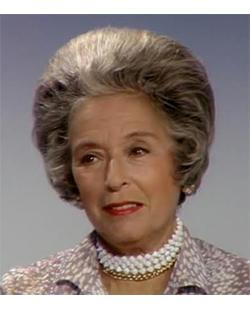Feminist Lawyers
It’s disheartening to enumerate the ways in which the government, the media, and society as a whole intrude on women’s bodies, private choices, and private lives. If it’s not an assault on Planned Parenthood, it’s a case in which a female celebrity’s nude photographs are leaked online and she’s victim-blamed for it. If it’s not lawmakers trying to force women to have funerals for fetal tissue, it’s the president proudly proclaiming his ability to grab women whenever and wherever he likes. Too often, it seems as though women and their decisions about their bodies and their privacy belong to the public here in America.
But there are ways to fight this kind of injustice, especially in the courtroom. One woman who was well-acquainted with the power of the law to protect women’s privacy was Harriet Fleischl Pilpel, a lawyer who invoked the right to privacy in her quest to legalize birth control and abortion. Today’s heir to Pilpel’s legacy is Carrie Goldberg, a Brooklyn attorney who specializes in defending women whose private lives have been invaded by so-called revenge porn on the Internet. Besides their groundbreaking courtroom work, both women share a vision for a more just society and are committed to mentorship and support of other women.
Harriet Fleischl Pilpel’s legal career was inextricably bound up in the history of 20th-century reproductive justice. She helped win several pivotal court cases about reproductive justice in the 1960s and 1970s by invoking women’s right to privacy when making medical decisions about their own bodies. Without her work, women might well not have legal access to abortions and birth control today.
Pilpel, who was born in 1911 in New York City, attended Vassar College and started her career with the firm Greenbaum, Wolff, and Ernst. While working there, she met Ernst’s client Margaret Sanger, whose work sparked her lifelong interest in birth control and reproductive justice.
One of Pilpel’s seminal cases was Griswold v. Connecticut in 1965, in which the Supreme Court examined a Connecticut state law that criminalized the use or encouragement of birth control. Pilpel wrote Planned Parenthood’s amicus brief for the case, in which she argued that the government has no business peeking into women’s private lives in the bedrooms and telling them whether they can use birth control. Her argument was instrumental in winning the case, but she didn’t stop there. After the right to privacy was enshrined in Griswold, she argued that the government also couldn’t tell women that they didn’t have the power to make a private choice about whether to have an abortion. Pilpel honed this argument when she wrote Planned Parenthood’s amicus brief as evidence for the “Jane Roe” side of Roe v. Wade in 1973, helping decide the case in favor of legalized abortion.
Besides her essential role in shaping the arguments that gave women the right to make private reproductive choices, Pilpel also served as a mentor to other young female attorneys working on this fight. At the request of Sarah Weddington, “Jane Roe’s” defender in Roe v. Wade, she organized a moot court practice for the attorneys working on the case before arguments were made in actual court, thus helping these attorneys hone their arguments and win the case. Through her mentorship, Pilpel empowered other women to defend their rights in the courtroom.
But perhaps most importantly, Pilpel possessed an intrinsic understanding of not just law, but also society and culture. Her friends and colleagues said that she grasped how the press, public opinion, and general zeitgeist can shape legal discourse. Pilpel wrote quite a bit about her legal opinions; she also lobbied and made frequent public appearances, thus helping to link privacy and abortion in the public’s minds. When she died in 1991, she left behind a legacy of court cases that secured essential rights for millions of women, as well as a vision for a more equitable and just society.
Like Pilpel before her, Brooklyn-based attorney Carrie Goldberg has dedicated her career to advocating for women’s rights, by pioneering the relatively new field of sexual privacy. Goldberg, who was born in Aberdeen, Washington and came of age in the riot grrrl 1990s, defends women who have been the victim of revenge porn. These cases typically involve women’s former partners posting pictures, sometimes naked, of them online without permission. Sometimes, the pictures include identifying details and contact information; sometimes they include demands for money.
Thirty-four states currently have laws against revenge porn, which hinge on the fact that posting these photos violates women’s right to privacy. Part of Goldberg’s career includes lobbying more states to adopt legislation that protects women from these privacy incursions. The other part of her career involves defense. Justice in revenge-porn cases can be difficult, thanks to the speed at which images spread online; victims’ reluctance to come forward; and victim-blaming and entrenched misogyny. Goldberg has sought that justice for dozens of clients by getting hundreds of pieces of revenge porn taken down from the Internet. She also handles school sexual assault cases; restraining orders against vengeful exes; and high-profile cases where celebrities are extorted for money online.
Goldberg doesn’t shy away from confronting the institutions that make these injustices possible. In 2016, she represented three teenage girls who were suspended after reporting sexual assault to their schools’ administrations; thanks to her, the New York City Department of Education went under investigation for these suspensions. Also in 2016, her defense of underage victims and her advocacy work led to investigations of Texas and Indiana school districts that had mismanaged cases of underage voyeurism and revenge porn.
Like Pilpel, Goldberg also has a reputation for mentoring and supporting other women. She acts as counsel, social worker, and friend to the often-young, often-vulnerable women she represents. She’s also been known to support other women in her field; for example, when one University of Miami professor who specializes in revenge porn law received lewd threats online, Goldberg sent her an encouraging note along with a lipstick called Lady Danger, which Goldberg wears when she wants to feel especially powerful.
Also like Pilpel, Goldberg is not just a brilliant legal strategist, she’s also a woman with a strong vision for how women in the United States should be treated. She regularly speaks to the media about the growing revenge porn problem, about sexual assault and harassment, and about the dangers of the Internet eroding individuals’ privacy and dignity. And as of April 2017, Goldberg’s firm has added to its services specialized legal responses to anti-abortion harassment occurring both in person and online. Pilpel would have been proud to know that another lawyer with a vision for women’s legal rights is tackling today’s most egregious assaults on women’s privacy.




